
The Iowa caucuses are quadrennial electoral events for the Democratic and Republican parties in the U.S. state of Iowa. Unlike primary elections, where registered voters cast ballots at polling places on election day, Iowa caucuses are meetings where voters gather to discuss and select candidates for their registered party. Political parties hold the caucuses, in contrast to most state-run primaries. Both presidential and midterm elections in Iowa use caucuses. The caucuses are also held to select delegates to county conventions and party committees, among other party activities.
This article contains the results of the 2008 Republican presidential primaries and caucuses.

The 2008 Nevada Republican presidential caucuses was held on January 19, the same day as the 2008 South Carolina Republican primary, with 31 delegates at stake. Mitt Romney was the winner in Nevada with 51% of the votes, with Ron Paul in second place. Half of Romney's votes came from Mormons, while two-thirds of the independent voters favored Paul. According to the Las Vegas Sun, Republicans crossed over in large numbers to vote Democratic; CNN exit polls indicated that Republican voters made up 4% of the Democratic caucus turnout.

The 2008 Maine Republican presidential caucuses were held on February 1, February 2, and February 3 at various locations throughout the state of Maine. The results were used to apportion 21 delegates for the state. The Maine Republican caucuses were the first caucuses in the 2008 election season in which Rudy Giuliani was out of the race.

Voters of the Republican Party elected state delegations to the 2012 Republican National Convention in presidential primaries. The national convention then selected its nominee to run for President of the United States in the 2012 presidential election. There were 2,286 delegates chosen, and a candidate needed to accumulate 1,144 delegate votes at the convention to win the nomination. The caucuses allocated delegates to the respective state delegations to the national convention, but the actual election of the delegates were, many times, at a later date. Delegates were elected in different ways that vary from state to state. They could be elected at local conventions, selected from slates submitted by the candidates, selected at committee meetings, or elected directly at the caucuses and primaries.
From 2011 to 2012, Ron Paul, a U.S. representative from Texas, unsuccessfully ran for the 2012 Republican Party nomination for the president of the United States.

The 2012 Iowa Republican presidential caucuses took place on January 3, 2012.

The 2012 United States presidential election in Nevada took place on November 6, 2012, as part of the 2012 United States presidential election in which all 50 states plus the District of Columbia participated. State voters chose six electors to represent them in the Electoral College via a popular vote pitting incumbent Democratic President Barack Obama and his running mate, Vice President Joe Biden, against Republican challenger and former Massachusetts Governor Mitt Romney and his running mate, Congressman Paul Ryan.

The 2012 United States presidential election in Maine took place on November 6, 2012, as part of the 2012 United States presidential election in which all 50 states plus the District of Columbia participated. Maine voters chose four electors to represent them in the Electoral College via a popular vote pitting incumbent Democratic President Barack Obama and his running mate, Vice President Joe Biden, against Republican challenger and former Massachusetts Governor Mitt Romney and his running mate, Congressman Paul Ryan. Obama and Biden carried Maine with 56.27% of the popular vote to Romney's and Ryan's 40.98%, thus winning the state's four electoral votes.

This article contains the results of the 2012 Republican presidential primaries and caucuses, which resulted in the nomination of Mitt Romney as the Republican nominee for President of the United States. The 2012 Republican primaries were the selection processes by which the Republican Party selected delegates to attend the 2012 Republican National Convention from August 27–30. The series of primaries, caucuses, and state conventions culminated in the national convention, where the delegates cast their votes to formally select a candidate. A simple majority (1,144) of the total delegate votes (2,286) was required to become the party's nominee.

The 2012 United States presidential election in Minnesota took place on November 6, 2012, as part of the 2012 United States presidential election in which all 50 states plus the District of Columbia participated. State voters chose ten electors to represent them in the Electoral College via a popular vote pitting incumbent DFL President Barack Obama and his running mate, Vice President Joe Biden, against Republican challenger and former Massachusetts Governor Mitt Romney and his running mate, Congressman Paul Ryan.

The 2012 United States presidential election in Michigan took place on November 6, 2012, as part of the 2012 United States presidential election in which all 50 states plus the District of Columbia participated. Voters chose 16 electors to represent them in the Electoral College via a popular vote pitting incumbent Democratic President Barack Obama and his running mate, Vice President Joe Biden, against Republican challenger and former Massachusetts Governor Mitt Romney and his running mate, Congressman Paul Ryan.

The 2012 United States presidential election in Washington took place on November 6, 2012, as part of the 2012 United States presidential election in which all 50 states plus the District of Columbia participated. Washington voters chose 12 electors to represent them in the Electoral College via a popular vote pitting incumbent Democratic President Barack Obama and his running mate, Vice President Joe Biden, against Republican challenger and former Massachusetts Governor Mitt Romney and his running mate, Congressman Paul Ryan.

The 2012 United States presidential election in Louisiana took place on November 6, 2012, as part of the 2012 United States presidential election in which all 50 states plus the District of Columbia participated. Louisiana voters chose eight electors to represent them in the Electoral College via a popular vote pitting incumbent Democratic President Barack Obama and his running mate, Vice President Joe Biden, against Republican challenger and former Massachusetts Governor Mitt Romney and his running mate, Congressman Paul Ryan.

The 2012 United States presidential election in Missouri took place on November 6, 2012, as part of the 2012 United States presidential election, in which all 50 states plus the District of Columbia participated. Missouri voters chose 10 electors to represent them in the Electoral College via a popular vote pitting incumbent Democratic President Barack Obama and his running mate, Vice President Joe Biden, against Republican challenger and former Massachusetts Governor Mitt Romney and his running mate, Congressman Paul Ryan.

The 2012 North Dakota Republican presidential caucuses were held on March 6, 2012. North Dakota has 28 delegates to the Republican National Convention; despite Rick Santorum's nominal win in the preference poll conducted during the caucuses, the majority of the delegates elected by the state party convention later in March said they supported Romney.

The 2012 United States presidential election in Oklahoma took place on November 6, 2012, as part of the 2012 United States presidential election in which all 50 states plus the District of Columbia participated. Voters chose seven electors to represent them in the Electoral College via a popular vote pitting incumbent Democratic President Barack Obama and his running mate, Vice President Joe Biden, against Republican challenger and former Massachusetts Governor Mitt Romney and his running mate, Congressman Paul Ryan. For the third election in a row since 2004, no third parties were allowed on the ballot.

Presidential primaries and caucuses of the Republican Party took place within all 50 U.S. states, the District of Columbia, and five U.S. territories between February 1 and June 7, 2016. These elections selected the 2,472 delegates that were sent to the Republican National Convention. Businessman and reality television personality Donald Trump won the Republican nomination for president of the United States.

The 2012 Maine Republican presidential caucuses were held between Sunday, January 29, and Saturday, March 3, at various locations throughout the state of Maine. Presidential preference polls were held at the caucuses, but those polls were not binding on the choices of delegates to the Maine Republican Party convention. The caucuses chose delegates in processes separate from the straw polling.

The 2012 Colorado Republican presidential caucuses took place on 7 February 2012. It was part of the 2012 Republican Party presidential primaries.






















